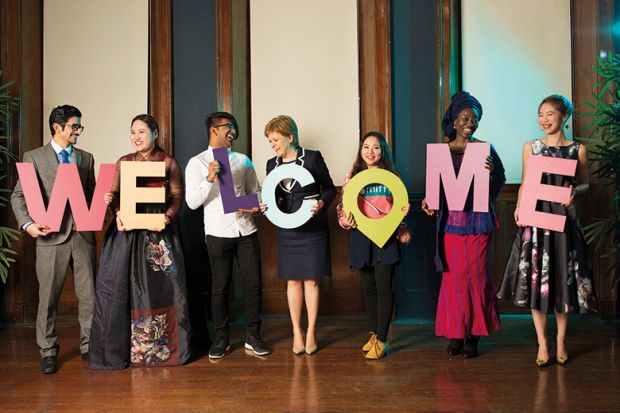Scotland’s first minister Nicola Sturgeon has helped launch a global campaign to encourage international students to apply to the nation’s universities.
Giving a speech to promote the “Scotland’s universities welcome the world” campaign, organised by Universities Scotland, Ms Sturgeon said the country was “very proud” of its “deep-seated sense of internationalism”.
“We’re incredibly proud that more than a fifth of our students come from outside the UK,” she said. “It’s a huge compliment to Scotland and it demonstrates that our universities really are world-class.
“But it isn’t simply that international students choose Scotland as a result of our universities being excellent, they are one of the reasons why our universities are excellent.”
Her speech is likely to be seen as a clear attempt to portray Scotland as having a more welcoming policy on international students than the UK government.
After what she described as an “extraordinary past few months” in the UK, in the wake of the European Union referendum, she added that she would continue to put pressure on the UK government to ensure that the status and rights of EU nationals living in Scotland would not change in the future.
“We have confirmed that eligible EU students already studying here – or starting a degree later this autumn – will continue to receive free tuition for the duration of their course,” she said. “We will continue to press the UK government to provide assurances that the status and rights of EU nationals currently living in Scotland will not change in the future.
“But more than anything else, every student who has come from outside Scotland – from the EU or further afield – to study here, is welcome.”
The campaign comes after recently released figures from the Higher Education Statistics Agency showed that international enrolments to Scotland’s universities rose by 3 per cent in 2015-16. Within that, there were 2 per cent more Chinese, 3 per cent more American and 8 per cent more Malaysian students.
These data came, however, before the outcome of the EU referendum and the spike in anti-immigration rhetoric, which could have had an impact on student choice.
Richard Williams, convener of Universities Scotland’s international committee and vice-chancellor of Heriot-Watt University, told Times Higher Education that although the campaign was not making “a massive political statement”, it was “attached to the politics of the situation”.
“[This is a] celebration of internationalism, which we feel is the heartbeat of every global, leading university,” he said. “Partly it is a manifestation of the challenges and negativity that have come from different [political] quarters. But fundamentally it’s so much in our being that we are international.”
He added that this openness to international “students and staff” was “critical” for UK higher education and moving away was “not a good message”, especially in light of the launch of the UK government’s industrial strategy.
“Many of the points of the pillars in the industrial strategy Green Paper are talking about business opportunities internationally, talking about globalisation, being competitive in science innovation,” he added. “If we want to be in the game we have to be global.”




